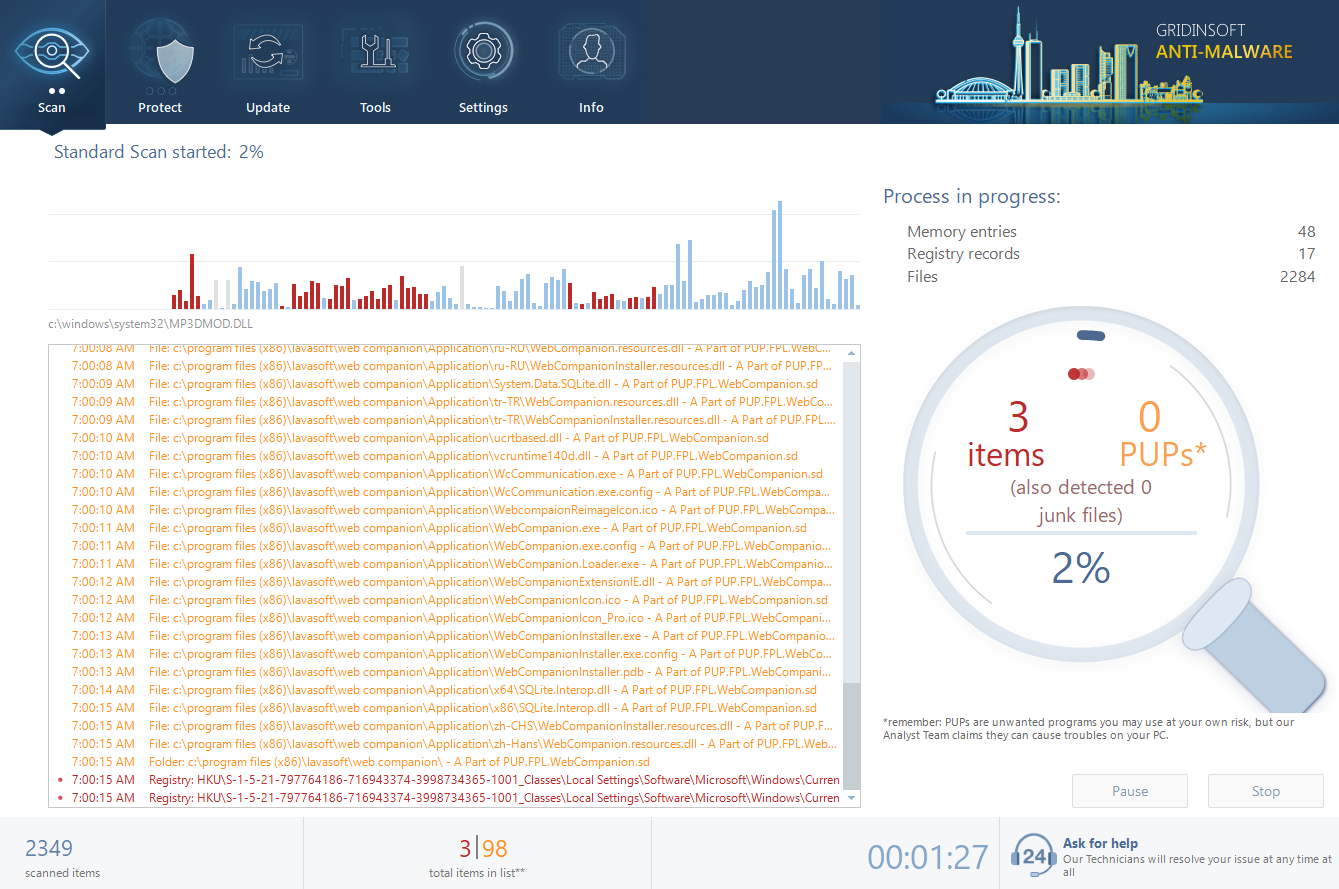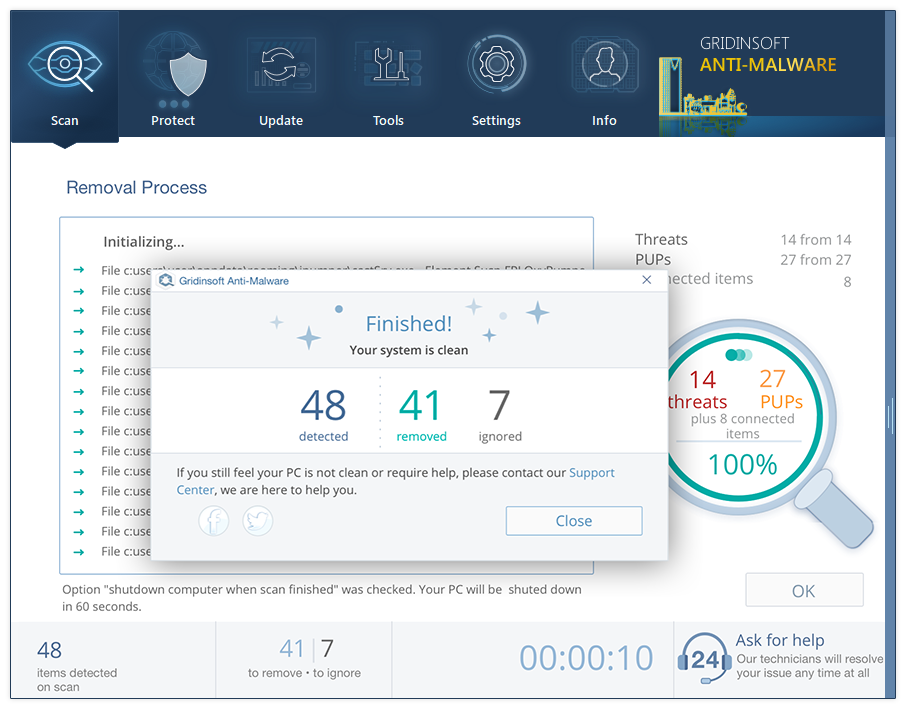RootTeam, a malicious software specifically designed to steal sensitive information from targeted systems, poses a significant risk to individuals and organizations alike. Its primary objective is to gather various data, operating covertly and often evading detection by security systems, remaining undetected for extended periods.
Learn More about RootTeam
RootTeam belongs to the classification of information stealers, a type of malware that poses a serious threat to computer systems and the security of sensitive data. It is explicitly designed to infiltrate systems and extract valuable information covertly for malicious purposes. To maintain persistence within the infected systems, RootTeam may employ advanced techniques that make it challenging to identify and remove while evading detection.
| Name | RootTeam Stealer |
| Detection | Trojan:Win32/Wacatac.B!ml |
| Damage | RootTeam can lead to financial loss, reputational damage, and compromised privacy. It steals sensitive information such as login credentials, financial data, personal details, and intellectual property. |
| Fix Tool | See If Your System Has Been Affected by RootTeam Virus |
Once RootTeam gains access to a system, it silently collects various types of sensitive information. This can include login credentials, financial data, personal details, and even intellectual property. The stolen information holds the potential for exploitation in identity theft, financial fraud, corporate espionage, or its sale on the dark web.
To remain undetected, RootTeam utilizes sophisticated techniques such as anti-analysis measures, rootkit capabilities, and encryption to obfuscate its presence and evade traditional security solutions. Additionally, it employs techniques like keylogging, screen capturing, and network sniffing to gather data discreetly without alerting the user.
A RootTeam infection can lead to severe consequences, including financial loss, reputational damage, and compromised privacy.
Overview of Information Stealers
Information stealers, including RootTeam, share common characteristics that enable them to carry out their malicious activities. They are designed to infiltrate systems secretly and operate covertly, evading detection by traditional security measures. These malware types typically focus on gathering sensitive data such as login credentials, financial information, and personal details.
Furthermore, information stealers employ advanced techniques to transmit the stolen data back to the attackers without alerting the victim or triggering security alarms. Examples of information stealers include Muggle Stealer and Phemedrone Stealer.
How Did RootTeam Infiltrate My Computer?
Cybercriminals utilize various methods to distribute malware, such as crafting convincing phishing emails to deceive users into clicking on malicious links or opening infected attachments. They also exploit vulnerabilities in software and operating systems to gain unauthorized access and establish a foothold within targeted systems.
In addition, cybercriminals may leverage compromised websites to inject malicious code or employ social engineering techniques to manipulate users into unwittingly downloading and executing malware. Furthermore, they exploit channels such as pirated software, cracking tools, key generators, and P2P networks to achieve their objectives.
Preventing Malware Installation
To avoid the installation of malware, it is crucial to download programs and files from reputable sources, such as official websites and verified stores. It is essential to exercise caution when encountering ads and links on dubious websites. Furthermore, it is advisable to refrain from opening links or files in suspicious emails from unknown senders, especially if the content appears irrelevant or unexpected.
Keeping the operating system and installed programs up to date is another crucial preventive measure. Utilizing a reputable antivirus solution and regularly running system scans is highly recommended. If you suspect that your computer is already infected, we suggest running a scan with Gridinsoft Anti-Malware, an automated tool that eliminates infiltrated malware.
How to remove the RootTeam from my PC?
RootTeam malware is extremely hard to delete by hand. It places its files in multiple locations throughout the disk, and can get back itself from one of the parts. Additionally, a range of changes in the windows registry, networking configurations and also Group Policies are quite hard to locate and change to the original. It is better to make use of a specific program – exactly, an anti-malware tool. GridinSoft Anti-Malware will fit the best for malware removal purposes.
Why GridinSoft Anti-Malware? It is really light-weight and has its databases updated almost every hour. Additionally, it does not have such bugs and vulnerabilities as Microsoft Defender does. The combination of these facts makes GridinSoft Anti-Malware ideal for eliminating malware of any form.
Remove the RootTeam with GridinSoft Anti-Malware
- Download and install GridinSoft Anti-Malware. After the installation, you will be offered to perform the Standard Scan. Approve this action.
- Standard scan checks the logical disk where the system files are stored, together with the files of programs you have already installed. The scan lasts up to 6 minutes.
- When the scan is over, you may choose the action for each detected virus. For all files of RootTeam the default option is “Delete”. Press “Apply” to finish the malware removal.



Frequently Asked Questions (FAQ)
RootTeam is a malicious software designed to steal sensitive information from targeted systems.
The primary objective of RootTeam is to gather various data from infected systems.
RootTeam operates covertly, often evading detection by security systems and remaining undetected for extended periods.
RootTeam poses a significant risk to individuals and organizations by compromising sensitive information and potentially leading to financial loss, reputational damage, and compromised privacy.
An information stealer, like RootTeam, is a type of malware that focuses on infiltrating systems and extracting valuable information for malicious purposes.
RootTeam silently collects various types of sensitive information, including login credentials, financial data, personal details, and intellectual property.
RootTeam employs sophisticated techniques such as anti-analysis measures, rootkit capabilities, and encryption to obfuscate its presence and evade traditional security solutions.
A RootTeam infection can result in financial loss, reputational damage, and compromised privacy for the affected individuals or organizations.
Yes, other examples of information stealers include Muggle Stealer, Meduza Stealer, and Phemedrone Stealer.
Cybercriminals distribute RootTeam through methods like phishing emails, exploiting software vulnerabilities, compromised websites, and social engineering techniques.
To avoid installing malware, it is important to download programs and files from reputable sources, avoid suspicious ads and links, be cautious with email attachments, keep software updated, and use reputable antivirus solutions.
If you suspect your computer is infected with RootTeam, it is recommended to run a scan with a reliable antivirus solution like Gridinsoft Anti-Malware to automatically eliminate the infiltrated malware.
How to Remove RootTeam Malware
Name: RootTeam
Description: RootTeam Stealer is a type of malicious software that infiltrates systems to steal sensitive information covertly. It gathers data such as login credentials and financial details, posing risks like identity theft and financial fraud. RootTeam Stealer evades detection using advanced techniques and can cause severe consequences, including financial loss and compromised privacy.
Operating System: Windows
Application Category: Malware

